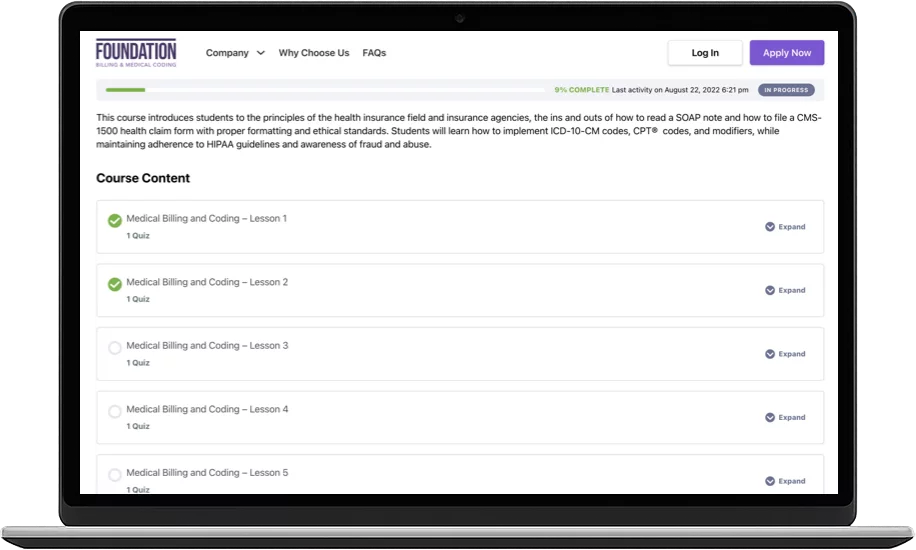Launch Your Healthcare Career with 100% Online Medical Billing and Coding Courses

Stay in Demand
Work in healthcare
Earn a decent salary
Grow your career

program structure
You’re Three Courses Away From a New Career
Our comprehensive training pathway consists of three progressive online courses:
Medical Terminology Course
Start here
- Introductory Course
- Duration: Approx. 3-4 months (self-paced)
- Recommended Weekly Time Commitment: 1-2 hours
one time cost
18 Monthly Payments
13.99% APR
Medical Billing and Coding Course
- Apply Your Learnings
- Duration: Approx. 5-6 months (self-paced)
- Recommended Weekly Time Commitment: 2-4 hours
one time cost
24 Monthly Payments
13.99% APR
Certified Professional Coding (CPC) Preparation Course
- Prepare for Certification
- Estimated Duration: 7-9 months (minimum 1 class each week and a half)
- Recommended Weekly Time Commitment: 2-4 hours
one time cost
24 Monthly Payments
13.99% APR
Real Students. Real Progress!

Why choose Foundation Billing and Medical Coding
Why Foundation Billing and Medical Coding?
Our Program Is Different
Instructor-Led Support, Even in a Self-Paced Format
Deep Curriculum = Real Career Preparation
Affordable,Transparent Pricing
Clear Outcomes and Certification Preparation




What Is Medical Billing and Coding? A Complete Career Guide for 2026
Billing and Medical Coding Guide
Interested in starting a career in Medical Billing and Coding? Learn what it takes to get started, what the salaries are like, and where you can expect to work!
Read Guide
Common Questions
Everything you need to know about billing and medical coding
Do I need healthcare experience?
No. Our first course is designed for beginners. You’ll learn everything you need to progress.
Will this help me get certified?
Yes. Completing all three courses prepares you to sit for the CPC exam.
Is there job placement?
While we don’t provide placement, our training prepares you for competitive entry-level roles.
Can I study part-time while working?
Yes. Courses are self-paced and designed to be flexible around work and life responsibilities.
How much does the full program cost?
Each course is priced separately and transparently. Total program tuition is $4,900 if completed in sequence.
Get in Touch With Your Instructor

Need More Info? Sign Up For Our Free Webinar!
We love meeting new students and guiding them in the right direction. Get access to our free webinar below where you can get a deeper understanding of the course curriculum and have a chance to speak to your instructor directly.
Sign up to join the next one!
Our next webinar is:
<!-- Calendly inline widget begin -->
<div class="calendly-inline-widget" data-url="https://calendly.com/fbmcbiz/fbmc-webinar" style="min-width:320px;height:700px;"></div>
<!-- Calendly inline widget end -->